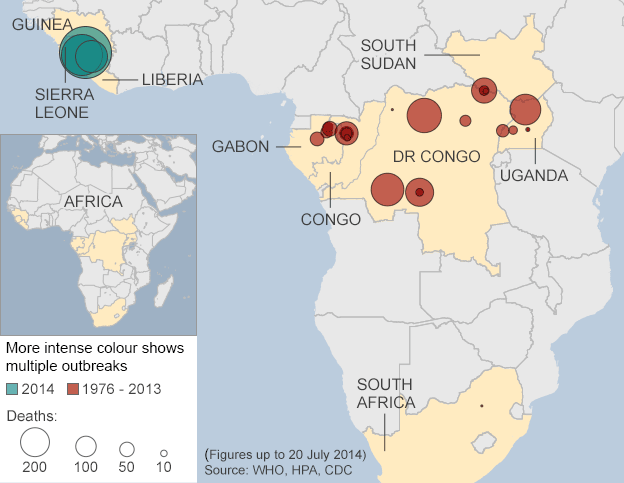
As the death toll for the Ebola Virus grows, it becomes more and more important to discuss the precautions to take to avoid the disease, and worse case scenario - what to do should you actually become infected.
What is Ebola?
The Ebola virus disease (EVD) is described by the World Health Organisation (WHO) as "a severe, often fatal illness in humans."
It first appeared in 1976 in two simultaneous outbreaks - in Nzara, Sudan; and in Yambuku, in the Democratic Republic of Congo. The latter was in a village situated near the Ebola River, from which the disease takes its name.
It is mainly found in tropical Central and West Africa, and can have a 90 per cent mortality rate - although it is now at about 60 per cent.
What precautions should I take?
Avoid contact with Ebola patients and their bodily fluids, the WHO advises. Do not touch anything - such as shared towels - which could have become contaminated in a public place.
Washing hands and improving hygiene is one of the best ways to fight the virus
Carers should wear gloves and protective equipment, such as masks, and wash their hands regularly.
The WHO also warns against consuming raw bushmeat and any contact with infected bats or monkeys and apes. Fruit bats in particular are considered a delicacy in the area of Guinea where the outbreak started.
What can be done if I catch it?
You must keep yourself isolated and seek professional help. Patients have a better chance of survival if they receive early treatment.
There are no vaccines, though some are being tested, along with new drug therapies.
Patients frequently become dehydrated. They should drink solutions containing electrolytes or receive intravenous fluids.
MSF says this outbreak comes from the deadliest and most aggressive strain of the virus, which kills more than 90% of patients.
Other strains are less virulent and have a survival rate of up to 75%.
However, it is not known which factors allow some people to recover while most succumb.
How big is the risk?
The World Health Organisation does not currently recommend any travel restrictions to Guinea, Liberia or Sierra Leone at this time, and at the time of writing, there has been no reported cases of EVD imported into the United Kingdom.
Public Health England (PHE) advises that the risk to tourists, visitors or expatriate residents in affected areas is considered very low if elementary precautions are followed.
The highest risks of infection are associated with caring for infected patients, particularly in hospital settings, unprotected exposure to contaminated bodily fluids, and unsafe medical procedures, including exposure to contaminated medical devices, such as needles and syringes.
Dr Doug Quarry, Medical Director at International SOS said:
“The risk to business travellers is low, if they follow the proper procedures. Business travellers or expats who need medical assistance should be aware that going to a local hospital that might be treating people with Ebola is risky.”
Where are the risk areas?
The travel advice section of The Foreign & Commonwealth website “FCO” can be consulted to obtain the very latest information on high risk areas, and whether it is safe to travel there (https://www.gov.uk/foreign-travel-advice).
Sierra Leone is now the epicentre of the epidemic, reporting the largest number of new cases since the previous update. As of 27 July, the cumulative total number of cases reported was 533 (473 confirmed, 38 probable and 22 suspected), and 233 deaths.
If you have any queries regarding the virus, please do not hesitate to get in touch with us, and we will do our best to advise you.